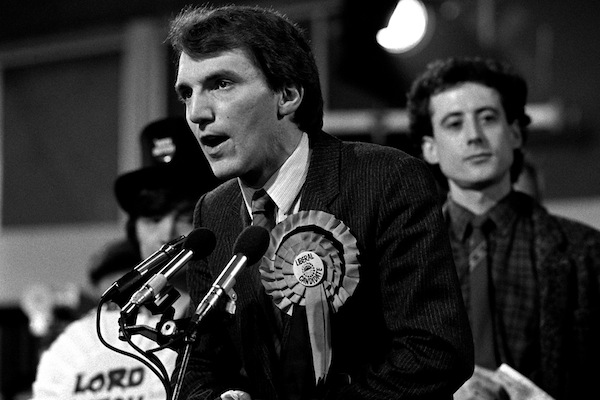I got a text message the other day, inviting me to a party. This is a nice thing to happen, and not an everyday event. I have become used to all modern forms of communication bringing nothing but trouble; the more modern they are, the more unpleasant will be the message. If it arrives via Twitter, it will usually be a condensed ball of noisome vomit, perhaps containing within it the vestige of a threat. In a sense, we are all Mary Beard these days. The nastiness rains down upon all of our heads, the nastiness from other people. Never mind.
But this was different; not merely an invitation to some sort of agreeable shindig where other people buy the drinks, and perhaps also festive finger food, but one which carried with it the soft thrill of nostalgia, taking me back to a time when I was young and terribly sure of myself, neither of which is true today. It was an invitation to attend the celebration of the 30th anniversary of the Bermondsey by-election.
Do you remember it? I remember it well. The invitation came from the offices of the winner back then, Simon Hughes, now still the MP for the same constituency and the deputy leader of the Liberal Democrats.
Back in early 1983 I was, as now, a member of the Labour party and absolutely chuffed to bits that my party had selected Peter Tatchell to fight the seat for us. I had some connection with Bermondsey — it’s where my mum was brought up, it was the home of the football club I supported, and I’d lived a mile or two distant for the first eight years of my life. So I was particularly pleased that Labour had eschewed the selection of one of those awful, fat, antediluvian working-class people who, like the resigning MP Bob Mellish, had represented the constituency from time immemorial. Instead they had chosen a young, radical poof. Good, I thought. That should bring some modernity to the area. And some progressive values. Exactly the sort of person Labour should be selecting in these working-class redoubts, regardless of what the local people might think, mired in their ignorance and conservatism.
Simon Hughes won the seat with the biggest swing in election history, an astounding, staggering 44.2 per cent. I was terribly depressed by this. I cleaved to the allegation — largely true, as it turned out — that the Liberal candidate had sat aloft a homophobic campaign: Liberal canvassers were seen wearing badges stating ‘I’ve been kissed by Peter Tatchell’. Hughes — irony of ironies — was bisexual, a fact he decided not to share with the electorate or the press at the time. He has since apologised for this, and also apologised (a bit) to Tatchell for the homophobia of the campaign, although denying he was directly responsible for it. In any case, there was plenty of homophobia coming from elsewhere, not least from the gruff whispers of Bob Mellish, who did not wish to see Tatchell selected.
Hughes has since represented Bermondsey with great diligence; he has been a fine constituency MP. And it was the start of the Liberal revival which later saw the party make inroads into the Labour vote in the inner cities of the north, where a complacent and arrogant Labour machine had for too long taken the votes of the working class for granted. The Bermondsey by-election proved Labour could be defeated even in its strongest seats, if it pushed the electorate too far.
I think it is a shame that Tatchell has not served as an MP, because he strikes me as a hugely decent, brave and principled chap; there are few people in public life I admire more. Further, elements of the campaign against him in Bermondsey were cruel and grotesque. It is at least partly down to Tatchell’s campaigning that such unrelieved bigotry simply could not happen now in the UK. That, I think, is a very good thing.
But still, all that being said, what smug and epic arrogance on behalf of me, and people like me, in the Labour party at that time. That we knew better what the working class wanted in its representatives, that the Labour party was not primarily about the minimum wage and job creation and better conditions for the very people who set up the party, but was there as a wedge for progressive values which were not remotely shared by the people we were purporting to represent.
Doubly so in the case of Bermondsey; it is often remarked that Hughes won his seat partly as a consequence of his dishonesty about his sexuality. Perhaps that is true. But it is also the case that the voters of Bermondsey were objecting less to Tatchell’s own homosexuality than to his unapologetic espousal of homosexuality; if they had heard that Hughes was himself gay (and rumours abounded even then), it would not have stuck in the craw in quite the same as Tatchell’s campaigning gay zeal. It was the hard left which ensured Tatchell got the chance to fight in Bermondsey, but times have changed; Labour still parachutes ‘progressive’ and politically correct candidates into supposedly safe seats where the new MP, if he is lucky enough to be elected, shares nothing whatsoever in common with the people who elected him, or her.
A few months after the Bermondsey by-election, I was out canvassing and campaigning for the general election from eight till six on my days off work. I wore ripped jeans and eyeliner and had hair spiked up like a hedgehog on amphetamines. I must have lost us, as I moved from door to door in a solidly working-class area, a good 500 votes or so.






Comments